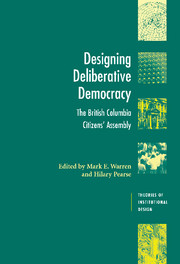Book contents
- Frontmatter
- Contents
- List of Tables
- List of Figures
- Contributors
- Preface
- Introduction: democratic renewal and deliberative democracy
- 1 Who should govern who governs? The role of citizens in reforming the electoral system
- 2 Citizen representatives
- 3 Institutional design and citizen deliberation
- 4 Agenda-setting in deliberative forums: expert influence and citizen autonomy in the British Columbia Citizens' Assembly
- 5 Descriptive representation in the British Columbia Citizens' Assembly
- 6 Do citizens' assemblies make reasoned choices?
- 7 Communicative rationality in the Citizens' Assembly and referendum processes
- 8 Deliberation, information, and trust: the British Columbia Citizens' Assembly as agenda setter
- Conclusion: the Citizens' Assembly model
- References
- Index
3 - Institutional design and citizen deliberation
Published online by Cambridge University Press: 22 September 2009
- Frontmatter
- Contents
- List of Tables
- List of Figures
- Contributors
- Preface
- Introduction: democratic renewal and deliberative democracy
- 1 Who should govern who governs? The role of citizens in reforming the electoral system
- 2 Citizen representatives
- 3 Institutional design and citizen deliberation
- 4 Agenda-setting in deliberative forums: expert influence and citizen autonomy in the British Columbia Citizens' Assembly
- 5 Descriptive representation in the British Columbia Citizens' Assembly
- 6 Do citizens' assemblies make reasoned choices?
- 7 Communicative rationality in the Citizens' Assembly and referendum processes
- 8 Deliberation, information, and trust: the British Columbia Citizens' Assembly as agenda setter
- Conclusion: the Citizens' Assembly model
- References
- Index
Summary
Charged with the task of evaluating the existing electoral system and deciding whether to recommend its retention or selecting a superior alternative, members of the Citizens' Assembly drew on three primary sources of information as they reached their decision: educational material distributed during the “learning phase,” written submissions and oral presentations made by members of the public during the “listening phase,” and the preferences of their fellow Assembly members voiced and debated during the “deliberation phase.” The CA model had been explicitly designed to expose members to these three forms of counsel but they were left to decide for themselves how to reconcile the overwhelming support for a mixed member proportional (MMP; see page 130) system expressed by members of the public with their own evolving preference for a single transferable vote (STV; see page 130) system.
Conflicting messages sent to Assembly members by particular institutional features of the process made this decision more difficult. On the one hand, the members' intensive education on electoral systems made them more informed on the topic than most of the members of the public they consulted, while on the other, the members were conscious that the first step in adopting any new system required the support of at least 60 percent of voters in a referendum with no significant public funding committed for a pre-referendum public education campaign.
Information
- Type
- Chapter
- Information
- Designing Deliberative DemocracyThe British Columbia Citizens' Assembly, pp. 70 - 84Publisher: Cambridge University PressPrint publication year: 2008
Accessibility standard: Unknown
- 5
- Cited by
